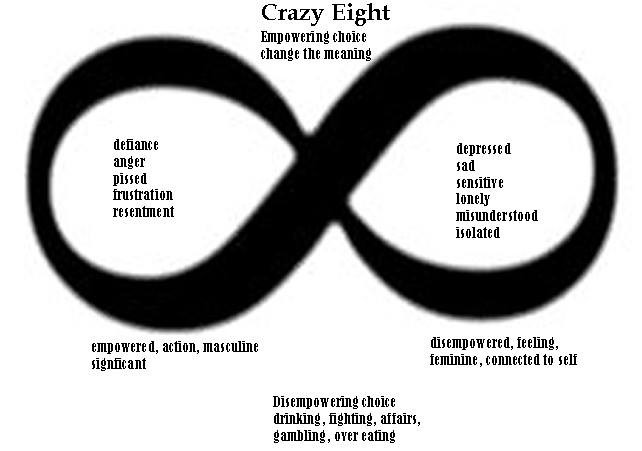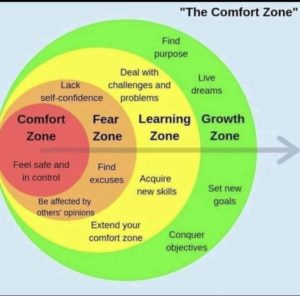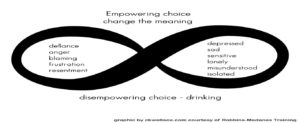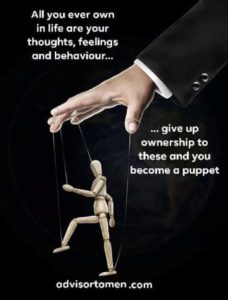
THE BOUNCE
The emotional crazy 8 involves bouncing from one negative extreme to another. Following the graphic , you see it goes from versions of sadness over to versions of anger and back to versions of sadness and back and forth again and again. You observe it in folks all the time, and you’ll notice it in yourself. No one is immune from them. They can also happen over a period of minutes and hours, and even days and weeks. Some people live a life as a crazy 8; we call this bi-polar disorder.
It doesn’t much matter what your severity is, when you find yourself in a crazy 8, the strategy is always a version of the same. It’s a good idea to try and listen to the beliefs which sustain it and notice what is happening to the body simultaneously, especially your breathing and where you hold tension.
Looking again at the graphic, you can see the problem for most of us who suffer from crazy 8 is the homeostasis found in the middle is elusive. For example: If I tell you a joke, will you laugh all day? No. Eventually, you will stop laughing as the enervating stimuli from the punchline dissipates and your body returns you to normal. You might remember the joke as funny and that you laughed, but mostly it’s behind you. You probably will offer no more than a smile of recognition hearing the joke again. That’s how things are supposed to work. Not so in a crazy 8.

THE ANGER
It’s the same if you get angry at someone. In everyday matters, we can find our balance quickly with those we live with. Even bigger issues between co-workers or friends dissipate in time. You may have noticed a day or two later, whatever happened doesn’t have the same effect on you. Maybe you even tell the person, “I’m no longer mad at you, I’m over it.” Or a version of this as your body and mind find a balance and move forward.
Everyone and anyone can fall into crazy 8 patterns and we shouldn’t assign an exaggerated pathology to it if there is at all a chance to self-regulate. That’s the goal of therapeutic treatment anyway.
Suspect you’re in a crazy 8 anger pattern if easily triggered into anger once more after-the-fact. It’s when just hearing about something that happened sets you off. Fritz Perls used to liken this to carrying a, “gunny sack of anger,” leftovers from “unfinished business.” Unresolved, these become heavier and heavier as time goes on. Adding more to our history, we are left feeling weighed down until we spend most of our energy carrying old grudges. Is that you?
THE BI-POLAR
My father was what they called a manic-depressive back in the 1970s. and suffered from the crazy 8 most of his adult life. We lacked understanding back then and so treatment was mostly pharmaceutical. Dad had a whole shelf of medications on the fridge door. Eventually, he moved the bookcases off the walls in his living room and created a maze you had to find your way through to his inner sanctum. There, he sat is his chair reading books and smoking a pipe, swinging emotionally from anger and defiance to sadness and self-pity and back again. This happened after he tossed out his older kids one by one, me included at age 15.
Then, he tried to commit suicide. Found by his wife, he never took a medication again. Nor did he get counselling, sparse then except for psychoanalysis which he would never undergo. He existed supported and protected by my mother (Sister Caroline, patron saint of the passive aggressive he called her privately), who made sure he was hardly ever stressed. They lived a life very much diminished, carried along by ma and the lives of his adult children. She finally died five years ago at age 86, and it wasn’t until these last three years of his life dementia knocked out his mood swings. Why? Because the beliefs and thinking which sustained his crazy 8 patterns were no longer possible as his brain deteriorated.
My father had been disowned by his father, a wounded and decorated World War One vet, of whom we would now recognize as suffering from PTSD. He’d been shot by a sniper and left for dead at one point but survived. Then, done with ground warfare, he became a Pilot’s Lieutenant and crash landed towards the end of the war. He didn’t come home for two years past the war’s end while convalescing at a British hospital.
Despite a loving wife who produced three daughters for him, my grandfather’s crazy 8 prevented him from accepting his youngest, my father, as his own. Though they looked like different-aged twins, my father lived with the burden of being rejected by his dad, who left his family when my dad was just a boy and spent a decade in a sanitarium. My father told me a few years ago about his first memory, of his father slapping his diminutive wife—my grandma Rita—around their kitchen. The little boy wanted to intervene and protect his mother but at just four years old was too afraid to go downstairs and confront him. He was about 87 when he told me.
Even when grandpa got out and he resumed life with grandmother decades later in the 1960s, and we were introduced to “Uncle Gimpy,” he insisted my dad was not his. Dad held his father’s hand at the veteran’s home when Grandpa Gimpy died at age 98, hoping for recognition, holding out until the end for reconciliation. None came and my dad carried that pain beyond when he died two weeks ago.
Solving the crazy 8 involves examining the beliefs behind the inability to self-regulate emotionally and installing new ones, releasing where stress is held in the body and controlling breathing. To change state, you can change what you do or what you think. Language and focus involve aspects of both, of doing and thinking, whereas the images which flash through our minds are very much a mental process.
THE BELIEF
There is always an irrational belief holding up our crazy 8 pattern. Often it is something akin to, “I must be loved by everyone,” which takes courage to find beneath the layers of bullshit we use to hide our real selves. As social animals, most humans have a fear others will discover they are not good enough and accordingly, they won’t be loved. Of course, this is both unreasonable and a destructive basis upon which to build a life, especially with 7 billion souls inhabiting the planet. It’s likely my father harboured an internalized belief which told him “If my father doesn’t accept me, it means I am unacceptable.” We will never know.
The tyranny of language plays a significant role in sustaining a crazy 8. Should, could, must and would are common modal verbs used to sustain your crazy 8. The phrase, “If only,” is another way language is used to sustain regret and injustice. Often these verbs and phrases figure in an irrational belief about others. If you listen to your thinking carefully you can detect them, as in, “They should have…,” or “If only I…,” which serves to recharge your anger or sadness with justification and sends your crazy around the infinity loop track one more time. The irrational belief is often, “I must always be treated fairly.” Nice goal but a fantasy in the end.
Albert Ellis was one of the guys we studied in college and he’s famous for exposing irrational beliefs. He came up with eleven general areas of irrational beliefs found in exaggerated form as follows:
1. It is a dire necessity for adult humans to be loved or approved by virtually every significant other person in their community.
2. One absolutely must be competent, adequate and achieving in all important respects or else one is an inadequate, worthless person.
3. People absolutely must act considerately and fairly, and they are damnable villains if they do not. They are their bad acts.
4. It is awful and terrible when things are not the way one would very much like them to be.
5. Emotional disturbance is mainly externally caused, and people have little or no ability to increase or decrease their dysfunctional feelings and behaviors.
6. If something is or may be dangerous or fearsome, then one should be constantly and excessively concerned about it and should keep dwelling on the possibility of it occurring.
7. One cannot and must not face life’s responsibilities and difficulties and it is easier to avoid them.
8. One must be quite dependent on others and need them and you cannot mainly run one’s own life.
9. One’s history is an all-important determiner of one’s present behavior and because something once strongly affected one’s life, it should indefinitely have a similar effect.
10. Other people’s disturbances are horrible, and one must feel upset about them.
11. There is invariably a right, precise and perfect solution to human problems and it is awful if this perfect solution is not found.
As you can see with Ellis’ irrational beliefs, he’s purposefully showing how unreasonable we can all be by demonstrating emotional prejudice at the core of our discontent. “Awfulizing,” is what he called it.
More than just seeing things pessimistically, the irrational beliefs show emotional immaturity, a self-centeredness which weakens a person and their standing among others. It also takes up a lot of energy and most of all, time.
THE NARROWING
Think for a moment of how much of your life spent upset to where your functioning was lessened or even came to a standstill. Add it all up you can easily see this is one of the most tragic wastes of the crazy 8. We think we have time for this shit. Truth is, none of us do.
Now, turn your attention to the body. In a crazy 8 you will hold tension in various places as you activate your HPA Axis, the Hypothalamus, Pituitary, Adrenal triumvirate at the core of your stress response. For some people it’s the lower back or neck, others gastro-intestinal, others may get headaches or have trouble with sleep. Signaled by events, you may release cortisol and adrenaline in classic fight or flight fashion. We tend to internalize these fear responses and can “freeze” them into our physiology. Where do you feel your tension?
During a stress response, the heart rate goes up, blood pressure rises, breathing shallows and the mind narrows its focus to find escape or resolve threat. Keep in mind the body drives the mind more than the mind drives the body. The vagus nerve complex connects your gut (100,000+ neurons) and heart (40,000+neurons) and every other organ (many more neurons) and informs the brain. Some 80% of these neurons are afferent, meaning they signal towards the brain, and only 20% send messages from the brain to the body. This tells us the Bodymind is a uniquely singular entity, and not separate parts of self.
Your brain is a predictive machine. Beneath awareness, in any given moment it takes a best-guess shot at what state to put you in to keep you safe. It makes its determination using your databank of experiences since birth. Afterwards, it corrects according to social reality. You are not reacting but predicting. This understanding also means the only way to create new feelings is to live new experiences.
So, two things about this. If we can change state by what we do and what we think, we can change our emotional state using breathing techniques. Any anxiety attack can be neutralized in a few minutes by going for a jog. Activating the muscles and your breathing in sync forces the mind to follow suit. It’s the Bodymind again. Smile at yourself in a mirror and feel your mood elevate. Sitting in a lotus position and doing seven long AUM chants (Aaaaah-Uuuuuum-Mmmmmm) lasting as long as you can using a full breath is a great way to re-establish your breathing control through deepening. Since stress shallows your breathing, filling the lungs by expanding the sternum to its maximum (belly breathing) counters the tightening up tendency of shallow fear-breaths. Sitting in lotus position imposes physical mastery.
Secondly, the stress response narrows focus. It does this to enable you to find escape or resolve whatever perceived danger is before you. Sometimes, it’s as simple as seeing a shadow outside at night, feeling momentarily afraid which narrows our focus so we squint and see the shadow is not a Sabre-tooth tiger waiting to pounce after all, but just the second smaller garbage bin we forgot we left there earlier. See how that works?
At the crux of all addiction is this quest to narrow focus; to take many thoughts and turn them into fewer thoughts or at least, different thoughts. We can become addicted to the our stress hormones. My unique view of addictions is that we hijack our HPA axis and sympathetic system to achieve narrowed focus relief, the real pay off we seek.
THE POISON
Gabor Mate once wrote: “For those habituated to high levels of internal stress since early childhood, it is the absence of stress that creates unease, evoking boredom and a sense of meaninglessness. People may become addicted to their own stress hormones, adrenaline and cortisol, Hans Selye observed. To such persons, stress feels desirable, while the absence of it (stress) feels like something to be avoided.” (When the Body Says No, p. 28, Vintage Canada, 2012. Note: Hans Selye didn’t say all that. Gabor Mate later told me he wrote the quote entirely himself; I suppose attributing it to Selye based on the great stress researchers work. I thought it a candid admission and one worthy of respect on all sides).
I bring your attention to this to show we can become addicted to the drama we create in our lives because it provides escape. It can also serve a purpose by providing leverage to maintain the status quo. As long as my father was in his crazy 8, the stark reality of his father’s rejection escaped him. It also gave him an excuse to not have to do much else and provided a him with a handicap. If he got anything done, he could say to himself, “not bad considering (insert injustice here).” If he didn’t get anything done, he could say to himself, “no wonder, with (insert injustice here).” The model of your world behind a crazy 8 is familiar—it’s the poison you know.
When we are bouncing around inside our crazy 8, we are in pain, but that pain is sometimes better than progress. Why? It’s like when a kid is left to cry it out in the crib. They scream and holler but eventually, they tire and go to sleep. All manner of such circumstances in our early lives conspire to brand us with fear, and once fear is seared upon the soul, we get used to it. It’s as if the Bodymind remembers fear saved you once, and so perhaps fear can save you again.

THE STRETCH
Paradoxically, because change is scary, we can stay in a crazy 8, “comfort zone” almost indefinitely, or hop from one to another for most of a life, as my father did. Complain and the medical community will label and medicate you. Others will just simply avoid you. While you’re at it, forget happiness. Why is that? Because happiness is a decision.
In life, you are either shrinking, stagnating or expanding. The poison you know in the crazy 8 gives you certainty. Certainty is important, survival demands predictability. However, the quality of your life will largely be a measure of how much UNCERTAINTY you can tolerate.
Too much certainty and you stagnate, and you can even regress. Adapt or die someone once said. You need to regularly push out of your comfort zone and try new things to keep the brain and body active. Learn a new language, pick up a musical instrument, visit somewhere you have never been, learn forgiveness, both for yourself and others. Grow or stay the child you were yesterday. Put another way, “there’s no rest for the wicked,” as ma used to say…
When you give a new meaning to whatever is sustaining your crazy 8 is best how to defeat them. The crazy 8 is always rooted in a childhood expectation not being met. It’s usually supported by the irrational belief, “I will be treated fairly.” And then, that version of justice filters through your internal bias (which we all have) to take your own side in things. Whose side do we expect the predictive brain to take? No wonder.
What if your model of the world includes more compassion for yourself by FIRST having compassion for others? Whether that be a family member or an ex or someone at work or in your community, the way out of negativity is through deciding you will bring your highest self to the fore. Resolving anger always starts with compassion. Remember: happiness is a decision. Emotion is a physical manifestation of your brain’s interoception and prediction mechanisms based on environment and history. The idea is to not let this prevent your well being going forward. Sometimes we need to take a deep breath and just LET THINGS GO.
How freeing it is to do this? Using your power in service of self and others finds meaning and freedom.
Soon, you see the interconnection between all things. If you are bouncing around inside a crazy 8, whose responsibility is it to extricate you from its clutches? Find it early, find it late, we must all find love.
Stay powerful, never give up
cw
Christopher K Wallace
© 2019 all rights reserved
Advisor to Men, Mentor at large
call me for free here



